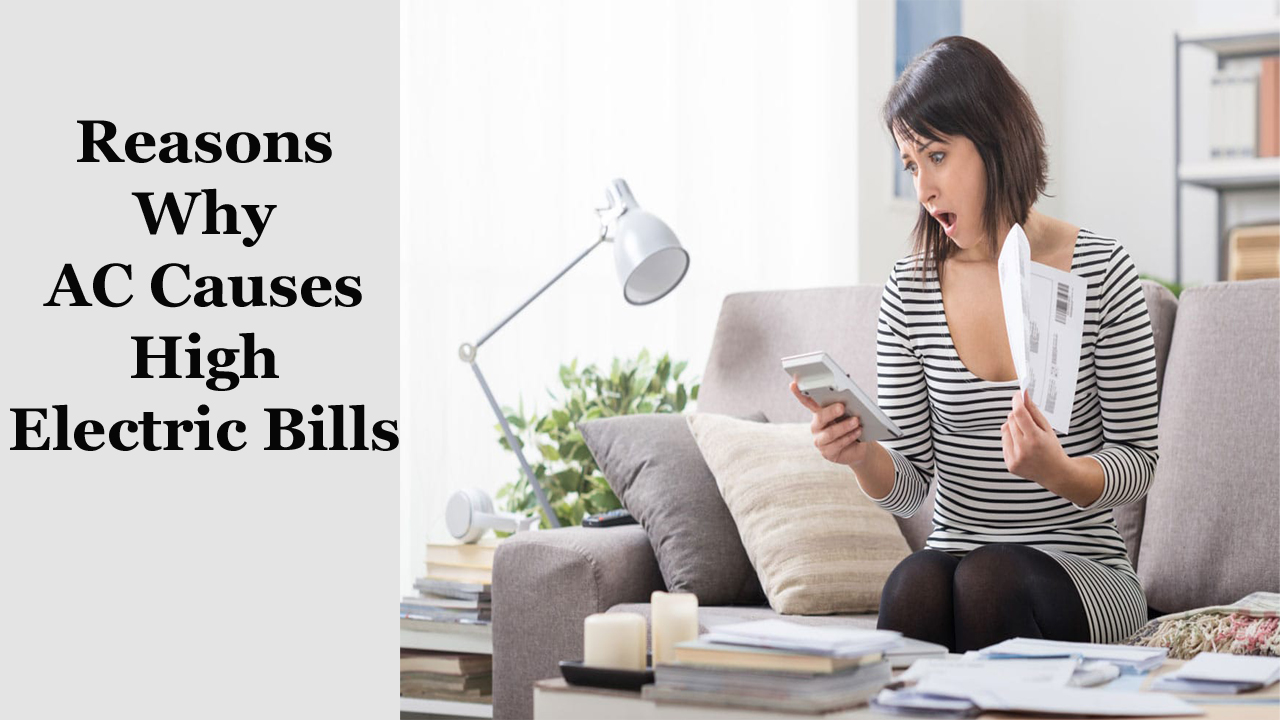Currently, due to climatic changes, we’re unable to predict the weather and entirely depend on luxurious lifestyles, which can also trigger various impacts from the financial drop to other consequences. In this blog, particularly we are going to get to know the consequences of using AC which can cause high electric bills.
It consists of effective seven reasons why using an air conditioner (AC) can end up in high electric bills:
Running the AC for extended periods: Higher AC usage rates result in more energy consumption, which is directly equal to higher electric bills. When you keep your AC on for long hours, even when you’re not at home, it can add up to a significant improvement in energy usage & cost.
Using a low-efficiency AC unit: If your AC unit is old or has a low energy-efficiency rating, it can consume more electricity to give you the same cooling effect as a newer, more efficient unit. Upgrading to an advanced & more energy-efficient unit can save you money in the long run.
Poor maintenance: A dirty or clogged AC unit can eventually minimize its efficiency, causing it to work harder and consume more energy. You’re supposed to generate periodic maintenance, like cleaning or replacing filters, to enhance AC’s efficiency and lower the energy consumption.
Leaky ductwork: If your home’s ductwork is leaking, your AC may have to work harder to cool your home, resulting in higher energy usage and costs. Having your ductwork verified and repaired can help improve your AC’s efficiency and lessen energy consumption.
Poor insulation: When your home is poorly insulated, it may not retain cool air as well, which can end-up with your AC working harder and consuming higher energy. Elevating your home’s insulation can help to reduce energy consumption and lower your electric bill.
Setting the thermostat too low: The lower you set your thermostat, the harder your AC has to work to get the required temperature, resulting in higher energy usage & costs. Setting your thermostat at a proper/standard temperature can help to reduce energy consumption and save you money.
Using additional appliances or lighting: Utilising additional appliances or lighting, especially those that generate heat, can make your AC work harder to cool your home, leading to higher energy usage & costs. Turning off unnecessary appliances and using energy-efficient lighting can support reducing energy consumption and lowering your electric bill.
Remedy: How to reduce the Electricity bill while using AC?
Below we haves some tips for minimizing your electric bill by using an air conditioner (AC):
- Set your thermostat to a reasonable temperature: Arranging the thermostat between mild to higher temperatures, like 78 degrees Fahrenheit, can help reduce the amount of energy your AC consumes while still keeping your home cool & more comfortable.
- Use a programmable thermostat: A programmable thermostat can automatically modify the temperature reference to your schedule and preferences in reducing energy consumption when you’re not at home.
- Maintain your AC unit: Periodic maintenance, like cleaning or replacing filters, can improvise your AC’s efficiency & reduce energy consumption.
- Insulate your home: Correct insulation can retain cool air and reduce the amount of energy your AC consumes to cool your home. Make sure while adding insulation to your attic, walls, and windows.
- Use ceiling fans: Ceiling fans can support you in circulating cool air throughout your home, reducing the amount of work your AC has to do to cool the space.
- Use blinds or curtains: Closing blinds or curtains during the day can help block out the sun’s heat and minimize the amount of work your AC has to do to cool your home.
- Turn off unnecessary appliances: Turning off lights & appliances that generate heat, such as ovens and dryers, can reduce the amount of work your AC has to do to cool your home.
- Upgrade to an energy-efficient AC unit: If your AC unit is old or has a low energy-efficiency rating, upgrading to a newer, more energy-efficient unit can help reduce energy consumption and lower your electric bill in the long run.
By ensuring these tips, you can help reduce the amount of energy your AC consumes and lower your electric bill.
FAQ’s
1.Why is my electric bill high even though I use my AC sparingly?
Other factors, including the size of your home, insulation, and other appliances, can affect your electric bill. If you’ve ruled out problems with your AC unit and settings, consider having an energy audit of your home to make sure of other sources of energy consumption.
2.Can closing vents reduce my electric bill?
Closing vents in unused rooms can reduce energy consumption but even can cause your AC to work harder to cool the rest of your home. It’s generally more effective to set your thermostat to a higher temperature to the level of low energy consumption.
3.Can turning off my AC when I’m not at home help reduce my electric bill?
Switching OFF your AC when you’re not at home can help reduce energy consumption and lower your electric bill. Ensure the programmable thermostat is enabled with automatic adjustment on your AC’s settings as per your schedule.
4.Can an old AC unit increase my electric bill?
Yes, an old or inefficient AC unit can consume more energy and increase your electric bill. Consider upgrading to a newer, more energy-efficient unit to reduce energy consumption and save money in the long run.
5.How can I tell if my AC unit is consuming too much energy?
If your electric bill has significantly increased, it may be a sign that your AC unit is consuming too much energy. You can also confirm the AC’s energy consumption by tracking your energy usage when your AC is running.


